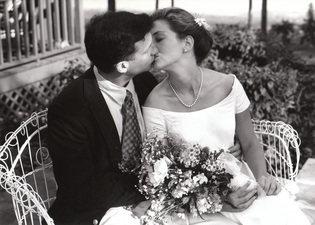discipleship
in chaos
Learn more about who we are by following our blog, written by our pastor, preacher, and chief evangelist. Engage in the everyday sacred as Abby writes about the deep and ordinary all at once.
As her grey heart rhythmically pulsed on the monitor it was as if all of life rushed before me—all that it is to be human contained within the walls of a pumping muscle.  Today I took my daughter to the cardiologist to make sure her heart murmur was “innocent” as preliminarily diagnosed. While there, my sweet girl had an ultra sound of her heart. She lay down on the sterile table with a deepening dimple, heart socks, and ribboned pig tails peeking out of her medical gown. The lights were turned down and the medical technician soon had my daughter’s beating heart, twisting and fluttering in various shades of grey, on the monitor before us. Without any warning my eyes filled with tears as I watched my daughter’s heart beating. My tears were not related to worry. Taking my daughter to the cardiologist did not even register as scary; both my son and I have innocent murmurs. “Why the tears?” I wondered as they continued to fill my eyes. I had multiple miscarriages. When I became pregnant with my final child—my daughter—I was monitored closely. In the first thirteen weeks of her gestation I had three ultra sounds. I waited desperately to see my tiny thumb sized baby’s flickering heart appear on the monitor. I had seen too many of my babies still, suspended in the black of the monitor, no flickering heart to be seen. When I was fifteen weeks pregnant with my daughter, I had a panic attack. I was sure my child had died inside of me like the others. My midwife confirmed my fear when she could not find the baby’s heart beat with her portable monitor. My husband and I sank into sobbing despair as we waited for an ultrasound to confirm the worst. Thirty minutes later my 14 week old baby’s heart flickered on the screen, beating with life. She was fine. It’s just that she had found a place to rest out of reach of the midwife’s monitor. I watched that heart flickering for a long time before I decided finally, maybe, I could allow myself to fall in love with this child I was carrying. Today as I watched that once tiny baby’s heart beat and beat and beat, I thought about all the life events that would break that heart wide open with love, compassion, grief, transformation. I thought of the many she would fall in love with and the many who would disappoint her. As her grey heart rhythmically pulsed on the monitor it was as if all of life rushed before me—all that it is to be human contained within the walls of a pumping muscle. My academic husband makes our children watch educational documentaries (they are not allowed to watch TV on a regular basis so they happily will sit through any documentary, just to have a chance at screen time). Recently they watched the documentary I Am. My middle son was taken with the documentary and shared with me what he learned: the heart sends more signals to the brain than the brain sends to the heart. With earnest expression that only an eight year old can muster, he proclaimed, “You see, Mom, everyone thinks the brain controls everything, but it doesn’t. It’s the heart. That’s why it hurts all the time, Mom. That’s why I can feel it inside me when I cry. My brain isn’t telling me anything; it’s my heart!” There you have it. I cried because I saw on a dim grey monitor my daughter’s very being, and for that matter the very essence of who we are as humans, why we ache, why we love, why we are so vulnerable to this beautiful and scary world. When God makes a new covenant with the Israelites after their exile from the Promised Land, this new covenant is not written as a law code on paper. Instead God proclaims through the prophet Jeremiah, “I will write this promise upon your hearts” (Jeremiah 31:33). And the promise is this: “You belong to me. You are my people.” I did not see the words--you belong to me--on the ultra sound monitor today. But I am sure I could hear them whispered with each beat of my daughter’s heart. She belongs to me, I belong to her, all of us belong to each other. All of us belong to God.
22 Comments
What I learned on vacation is that confronting our brokenness doesn’t have to be awful (even if it is hard). Instead, if we remember the God who invites us to such self-examination loves us better than we love ourselves, than the 40 days of Lent can be a vacation from the rest of the world. Lent is coming. What a downer. Yes, once again, a supposed ordained minister is saying highly irreverent things. (You should read my blog on atonement.) Let me try again: Oh boy, Lent is coming! I love Lent! I love examining all the broken pieces of my life and coming to terms with the in-your-face reality that I suck at following Jesus. I also love giving things up! I love repentance! I can’t wait! Welcome Lent! Do you believe the above garbage? Let me pause for those of you who have no idea what I’m rambling on about. Lent is a period of forty days that begins with Ash Wednesday (the mysterious day during which lots of people have dirt on their foreheads) leading up to Easter. Check out this quick primer on you tube: http://www.youtube.com/watch?v=m3L3c23MfC0  Lent lacks all of the mysterious wonder of Advent, the time in which we wait for the birth of the manger baby. Instead, Lent leads us toward Bad Friday, the day we remember Jesus’ horrific death instead of his cozy birth. And yes, Lent truly ends with the Alleluia’s of Easter, but let’s be honest, Lent seems to prepare us for a cross, not an empty tomb. Traditionally, Lent has been a time in which observant Christians painstakingly examine their lives. It is a time in which we come to terms with our own brokenness in order to make room for Jesus to move in and sweep our hearts clean. I can tell you many reasons the above is an important, in fact crucial, aspect of the Christian life. But that changes nothing for me. I hate it. It is miserable. I don’t want to examine my brokenness. It’s exhausting. I have had a bit of a revelation, however, that has saved me, and maybe will save you, from totally detesting the ancient Christian season of Lent. I gained this little perspective on vacation this past January. Vacations are often the only time I have the space or time to reflect. And during our past family vacation it became evident to me that I had been a bit of a snarly, pissed-off-over-worked, impatient mother. In fact, when I asked my family if I had been that bad the previous fall, they broke out in laughter. And then when I pressed them even further, they all agreed I had been complaining a great deal. In the words of my seven year old, eye brows raised, “O Mom! You complain all the time!” Yikes! That hurt. I was on vacation with my beloved family and they all told me I was a bitter complainer. To make it worse, I like to imagine myself as a grateful person. Last I checked grateful people don’t complain a lot. But there I was, in the midst of a beautiful vacation from my life, my back to a wall. I had two choices before me: 1) I could deny I was a complainer and hate my family for telling me incorrect information and ruin my vacation 2) I could accept their painful truth and start changing my ways while in the relaxed womb of vacation. I chose option two. I had been a complainer. And it was a lot easier to start changing my ways while I was on vacation from the constant pressures of our lives. The best news was that when I checked in with my family recently they confirmed my hope—I have been complaining less. (At least I have made strides in one area of my life.) Lent can be like vacation. It’s God’s invitation to take a step back and reflect, evaluate, take stock. God’s invitation doesn’t have to feel like penance (hello, related to the word penitentiary!). It isn’t like being thrown into a cell with a dirt floor, people screaming a litany of our broken ways through bars. Instead, Lent can (and perhaps should!) feel like a vacation—like a forty day invitation to vacate our day to day lives and come face to face with a God who has claimed us as her very own beloved. For some of us this invitation will mean taking on a new spiritual practice. For others it will mean writing a list of the endless blessings in our lives. For others of us it will mean confronting the hard truth that our brokenness (complaining) has been affecting those around us. For others of us it will be something entirely different. What I learned on vacation is that confronting our brokenness doesn’t have to be awful (even if it is hard). Instead, if we remember the God who invites us to such self-examination loves us better than we love ourselves, than the 40 days of Lent can be a vacation from the rest of the world. Lent can be a safe place to take a serious look at who we are. Then, just maybe, we can become the person God invites us to be. God calls all of us to life-long committed love in romantic and non-romantic relationships. And for that reason alone, I cannot call marriage sacred. Instead, I believe love is sacred.  With Valentine’s Day approaching, I’m aware that I’ve been virtually silent on romantic commitment. The religious right should not own the marriage monopoly, yet they will unless progressive Christians such as I don’t speak up (or in this case write) about the relationship our western culture calls marriage. Let me begin with my very long list of reservations that have kept me until now from voicing an alternative opinion on marriage: 1. I have been married for only 14 years and I am convinced the reason my marriage works is due to my husband’s exceptionally even keeled nature. Hence, I may be the wrong person to write this blog. But I am equally convinced that my husband wouldn’t write a blog post, but a theological treatise on the doctrine of “progressive Christian marriage.” If you would like to read an example of his work, check out his book: Ramanuja and Schleiermacher: Toward a Constructive Comparative Theology. It can be purchased on amazon. No thanks needed. 2. I don’t think marriage is for everyone and I don’t think it has to be. I don’t like rules or boxes. For this reason I cannot insist that marriage is for everyone. 3. Too many people define marriage as a legal contract between a man and a woman. I consider lots of couples, who don’t possess a marriage certificate, married. In the same way, I am positive marriage is not limited to a man and a woman, but that marriage includes all sorts of gender and sexual combinations, period. 4. I hate the word wife. 5. I’m not sure the very institution of marriage is sacred. 6. My decision to get married rested solely on the desire to spend the rest of my life with my husband. It had nothing to do with my reverence for the institution of marriage. To be brutally honest, I think I sought the legal and religious seal so that everyone else would take my commitment to my beloved as seriously as I did. So why get married? I have not one good reason for you. But I have a litany of great reasons why being a life-long partner with another is one of the paramount journeys a human can venture. #1 God calls us to bare our souls to one another. It is only in being completely and totally vulnerable to another person that we can come to understand what it is like to be loved completely and in turn how to love another completely. (Note to those who are not familiar with Jesus and the Gospels: it’s all about radically LOVING others). This sort of utterly vulnerable love can, and does, happen outside of romantic life-long relationships. Yet the very nature of life-long partnership seems to be the most fertile ground for such love to take root. I could not hide from my husband as he shot me in the ass (yes the ass!) with hormones in hopes we would get pregnant. And I could not hide from him months before, even if I tried, the overwhelming grief I felt after we miscarried. The mud and muck of this terribly beautiful world which life calls us to walk through will also bring us to our knees. When we are knocked down the only way to survive is allowing another to love us as we sit in the mud. Most often the person who loves fully, who also knows why we are sitting in the mud, is the same person to whom we have committed spending our lives. And it is in those very muddy moments that we come to know what it means to be loved, to love, and ultimately what is means to be loved by God. We discover Grace in the vulnerability of the mud. #2 God call us to community. We are not made to be alone. We are made for one another. Marriage is too often thought of as a coupling. Marriage is truly a community that begins with two individuals, but hopefully invites the divine into the dance, and then others like friends, and children, and the lonely, broken hearted, defenseless, and blind. (Luke 4). When we live securely and freely in the love of another we can more easily build our community from inside out. Healthy life-long partnerships are an essential building block in healthy communities. #3 God call us to stick it out. (What a drag!) The very life and ministry of Jesus of Nazareth attests to this reality. The disciples followed Jesus across the country side with no promise of shelter, food, or a pension plan. Jesus stuck it out on the cross in order to reach the empty tomb. God calls us to stick it out. Very few things in our culture these days require unconditional commitment. We change jobs often, move to new communities with ease (I know packing is no fun, but we’re not talking covered wagons!), lose weight, quit the gym, join the gym, friend and unfriend with the click of a mouse, and change hair color with a trip to CVS. Yes, there are some who change their spouse as easily as their hair color, but the vast majority believes they will spend their life with “that” individual. Life-long partnership is the place where we discover what it means to stick it out. When we do stick it out, we often discover a more full and rich life. In case my words are misunderstood, let me be clear: I believe divorce is a blessed choice in many relationships and I believe very few enter divorce lightly (unless perhaps you’re a celebrity). Yet I also believe there are many relationships in which both partners who are determined to stick it out discover deeper truths then they would throwing in the towel. #4 God calls us to love. Is there anything else to say? Because of #1, 2, & 3 I love my beloved more deeply, vulnerably, and authentically than any other human being in the world. You may wonder if that is really true: does she love her husband more than her children? Yes, in a way. I never had to work hard at loving my children; they are mine to protect and care for. And I am not vulnerable to my children; it is not their job to care for me. **** If you are married, divorced, single, determined not to legally marry your beloved, or if you are one of the many unjustly banned from the legal institution of marriage, the above list still matters. God calls all of us, not just straight women who are lucky enough to marry even-keeled (very good looking, he would have me add) men. God calls all of us to life-long committed love in romantic and non-romantic relationships. And for that reason alone, I cannot call marriage sacred. Instead, I believe love is sacred. After all, God is love. *For those of you wondering, yes that is me 14+ years ago at my wedding. Don't I look insanely and romantically young?! As for the good looking young guy; that's my beloved. |
Abby HenrichRev. Abigail A Henrich (ehm!) is an ordained minister who earned her stripes at Princeton Theological Seminary and Colgate University. That said, Abby is really a mother-pastor-spouse who lives in a kinetic state of chaos as she moves from her many vocations: folding laundry, preaching, returning phone calls, sorting lunch boxes, answering e-mails, and occasionally thinking deep thoughts in the shower. Unabashedly she is a progressive Christian who believes some shaking up has got to happen in the church. Categories
All
Archives
March 2024
|